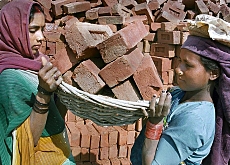Small loans fund big dreams

In developing countries microcredit is transforming the lives of millions but this type of small loan is also helping people in Switzerland achieve their goals.
Thanks to a Lausanne-based foundation, would-be entrepreneurs who have been turned away by mainstream banks are being thrown a lifeline.
The term “microcredit” refers to a small amount of credit loaned to a microentrepreneur often without collateral. In the developing world this system of loans has benefited the very poor, enabling them to become self-employed.
This model inspired the former Swiss industrialist Georges Aegler to offer financial assistance to people who had a dream but were unable to secure finances from conventional sources.
His organisation, Asece, is willing to make individual loans up to SFr30,000 ($23,614) without asking for surety. But applicants have to make a reasoned case for the money and convince a panel that they have the drive to succeed or at least try.
Only one in ten applicants is granted a loan, which Asece says is due to its rigorous selection process. Interest rates are low – between four and five per cent – and debtors have up to five years to pay the loan back.
Since the foundation was set up in 1998, Asece has poured SFr1.3 million into helping people set up their own businesses.
It has financed nearly 70 projects, leading to the creation of almost 200 jobs. Nearly half of the ideas were put forward by people who were previously unemployed.
The scheme generates more than SFr20 million a year.
Dream come true
Dominique Coispine is one microentrepreneur who struck it lucky. A trained chef, he wanted to open his own restaurant. His first port of call was mainstream banking.
“When you think money, you think bank but it’s not worth entering these places because they won’t lend you any [especially as] we were a family with three children and we didn’t have any money or property,” Coispine said.
After his requests for finance were turned down by a number of banks, Coispine heard about Asece through word of mouth. He met Aegler and was encouraged by the response from him and his team.
“They were people who listened to you, not like in banks. Georges Aegler said ‘even if it doesn’t work, you have to try’,” Coispine said.
Asece gave Coispine SFr28,000, which helped him take over the Auberge Communale in Léchelles, a village near Fribourg in western Switzerland, three years ago.
The building belongs to the commune but Coispine and his family live and manage the facility, which includes a bistro, a restaurant and a community hall.
“The Auberge is the heart of the village; we wanted to work somewhere like Léchelles, where you can do something for the village, like creating jobs, which is something we’ve managed to do,” said Coispine.
With three children aged from nine to 13, he and his wife wanted to be able to make a living and spend time with the family.
Three years on, the couple has nearly paid off all the money they borrowed to set up the restaurant. They also have four employees and family life has improved.
Fresh food
While they technically work a five-day week, there is still much to be done when the customers are not around.
“We do everything here – we bake our own bread, you won’t find any frozen or preserved foodstuffs in our kitchen, the meat always arrives fresh but it is also important for us to have two days with the children,” said Coispine.
The recently refurbished dining room can serve up to 20 people and is usually booked out on Friday and Saturday evenings.
While many of the diners, especially during the week, are local, gourmets from further afield in western Switzerland now come to Léchelles.
“We do have our regulars but I don’t have a speciality; recently I made coq-au-vin because I got a delivery of two cocks. When I see produce like this, I’m inspired to make this dish,” Coispine explained.
swissinfo, Faryal Mirza in Léchelles
Retired industrialist Georges Aegler set up Asece in 1998 to give loans without collateral to would-be entrepreneurs unable to secure funding.
The project has to be commercially viable and financial experts are involved in assessing the applications.
The maximum loan is SFr30,000; all loans must be repaid within five years.
Asece has funded nearly 70 projects to the tune of SFr1.3 million since its inception; only six have failed.
Microfinance refers to loans, savings, insurance, transfer services and other financial products for low-income clients.
Microcredit is a small amount of money loaned to a client by an institution often without collateral.
There are some 500 million borrowers worldwide.
Microenterprises make up 80% of all businesses in developing nations.

In compliance with the JTI standards
More: SWI swissinfo.ch certified by the Journalism Trust Initiative

You can find an overview of ongoing debates with our journalists here . Please join us!
If you want to start a conversation about a topic raised in this article or want to report factual errors, email us at english@swissinfo.ch.